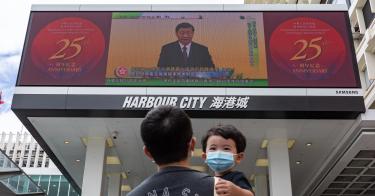Last year, the Chinese people were horrified by a video showing a mother of eight chained inside a freezing shed in the middle of winter. Her husband had purchased her from human traffickers more than two decades earlier. This month, he and five others connected to the case were sentenced to between eight and 13 years in prison.
Three days later, another Chinese court sentenced a pair of human rights lawyers to 12 and 14 years. Their crime? Encouraging citizens to exercise the rights enshrined in China’s Constitution.
These two cases have little in common, but their contrast tells an important truth about China’s justice system. In the one-party state, human rights advocates are punished more harshly than human traffickers.
On the surface, China’s government has come a long way from the overt hooliganism of the Mao Zedong era and the runaway crime that accompanied Deng Xiaoping’s economic reforms. Current Chinese leader Xi Jinping’s illiberal judicial “reforms” and the government’s use of draconian surveillance technologies have led to a precipitous drop in crime.
>>> Chinese Influence in the U.N. Threatens Human Rights Globally
But beyond this veneer of stability, China’s judicial system remains more similar to Mao’s hooliganism than to the “rule of law” image Beijing seeks to present. Indeed, it remains primarily a tool to expand and project the power of the ruling Chinese Communist Party—often at the expense of the Chinese people. The countless “reforms” and technological advances haven’t brought it more in line with the international community; they’ve simply helped the party exert its control more effectively.
To be sure, China has many highly professional police officers and judges who seek to protect the interests and well-being of residents. But they operate under the thumb of the CCP, which has a history of intervening in legal cases and makes no secret of prioritizing perceived threats to the party leadership above even the most heinous crimes.
The perpetrators in the case of the chained woman deserved what they got, and many in China believe their punishments should have been harsher. But they almost got away scot-free. The authorities acted on the case only after video of the woman went viral and the public didn’t buy their initial “finding” that there was no foul play.
Meanwhile, the authorities spared no time or effort in prosecuting the human rights lawyers, who were, by most accounts, upstanding citizens. The “New Citizens’ Movement” they promoted called on citizens not to oppose the CCP regime—which would be a violation of Chinese law—but to exercise the rights their national constitution claims to guarantee.
The fact that human rights lawyers working within the confines of Chinese law received harsher sentences than human traffickers selling disadvantaged women into slavery reveals anew the utter depravity of China’s justice system and the governing party that controls it.
In a recent report, The Heritage Foundation details how, in China, “fundamental freedoms like speech, assembly, press, and religion, are undermined by CCP policies designed primarily to protect the pre-eminence of the party.”
>>> Winning the New Cold War: A Plan for Countering China
The report calls for consistent efforts by the U.S. government to highlight Beijing’s human rights abuses, not only to support its victims but also to “undermine the legitimacy of China’s claim that the nation is a responsible global actor.”
It is time for Washington to recognize that what happens in China doesn’t always stay in China. While Washington cannot force Beijing to give its people the dignity they deserve, it can oppose China’s efforts to present itself as America’s moral superior and promote its political—and by extension, judicial—system as a model for the developing world.
By making China’s dismal human rights record a key talking point in diplomatic exchanges, Washington cannot only defend U.S. leadership but make China’s autocratic political system less palatable to the impressionable developing countries it seeks to court.
China’s incessant persecution of human rights advocates should not be allowed to continue in silence. The fact that such individuals—often among the most upstanding and courageous members of society—are treated more harshly than depraved criminals shows just how backward China’s single-party autocratic system is. The U.S. should call it out loudly and clearly on the international stage at every available opportunity.
This piece originally appeared in The Washington Times



